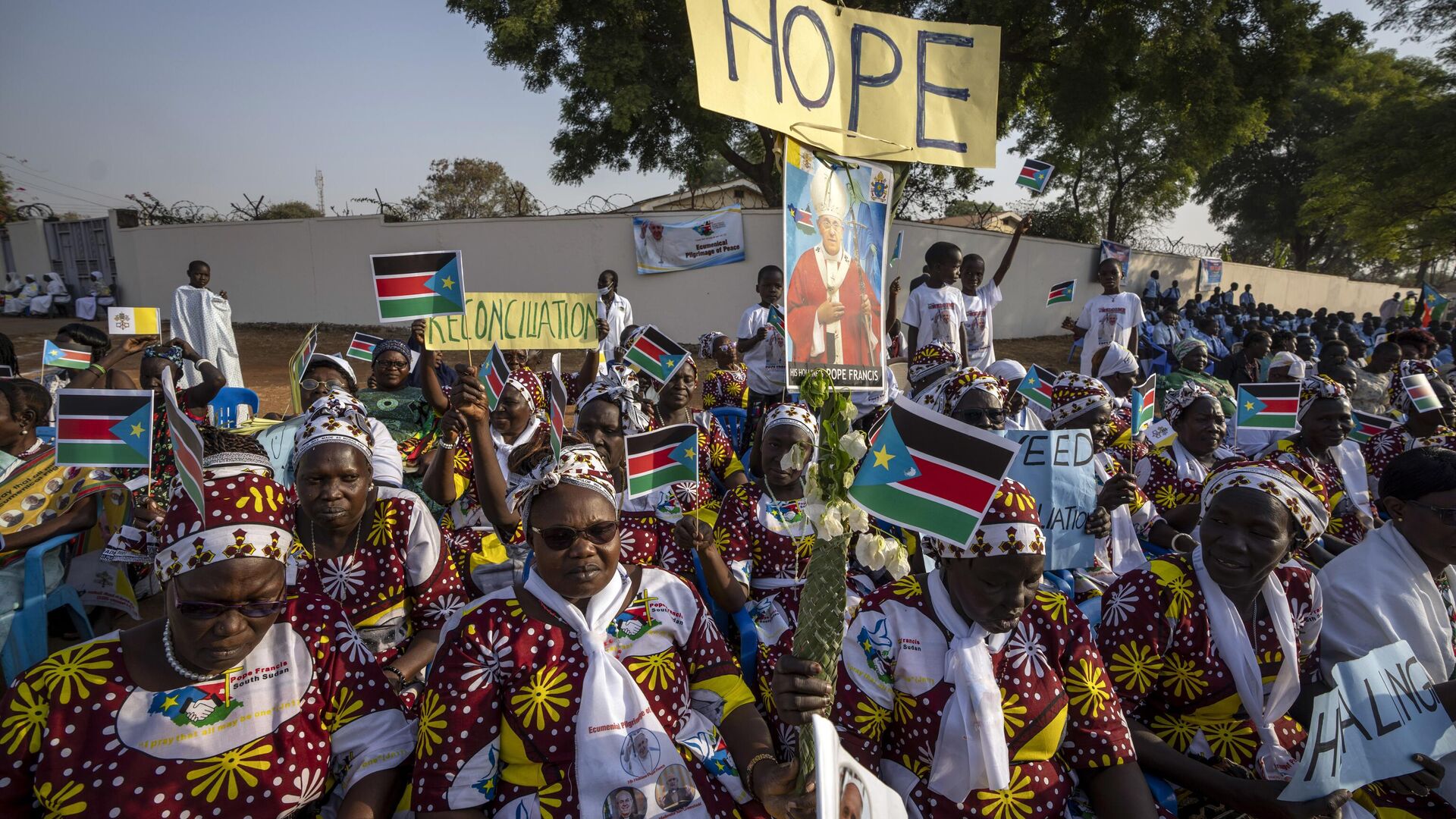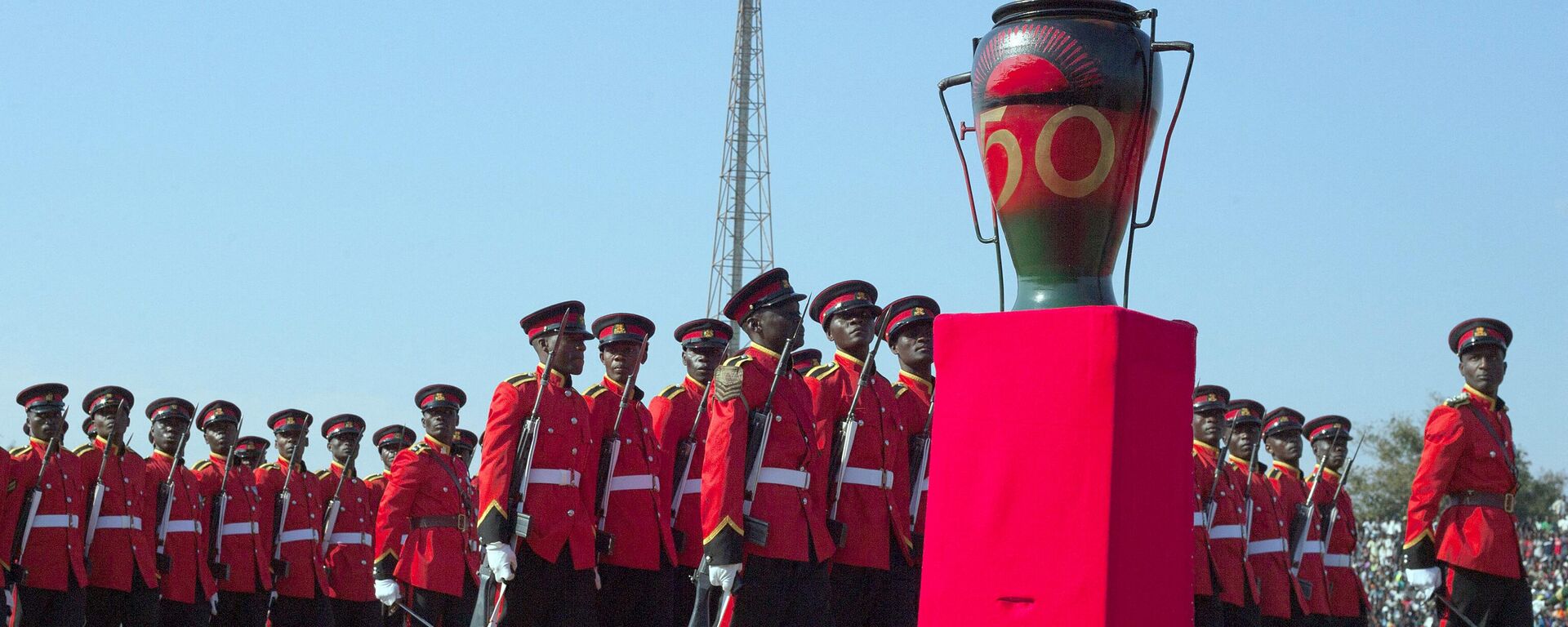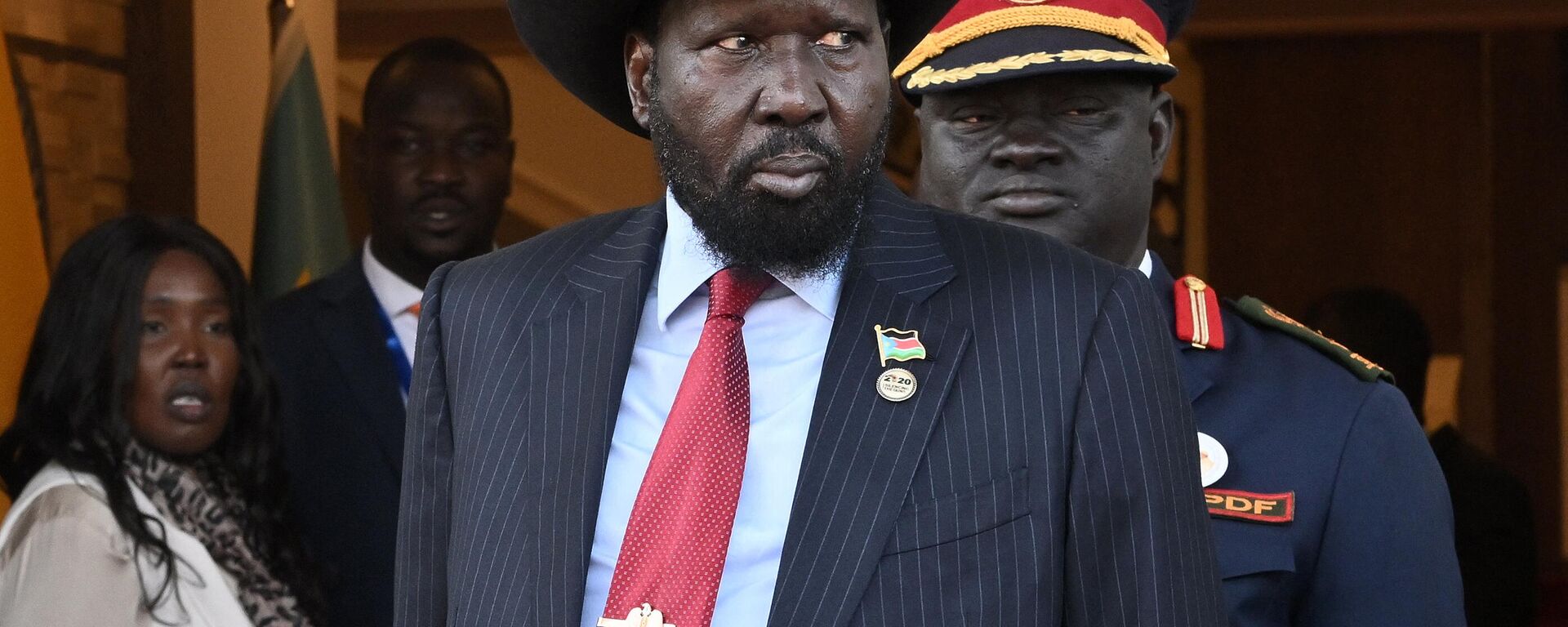https://en.sputniknews.africa/20230709/south-sudan-worlds-youngest-country-celebrates-12th-independence-day-1060435333.html
South Sudan: World's Youngest Country Celebrates 12th Independence Day
South Sudan: World's Youngest Country Celebrates 12th Independence Day
Sputnik Africa
On Sunday, the people of South Sudan celebrate the 12th anniversary of independence, the day on which the country was born. The path to independence was... 09.07.2023, Sputnik Africa
2023-07-09T17:37+0200
2023-07-09T17:37+0200
2023-07-10T09:20+0200
south sudan
east africa
independence
national holiday
sudan
north africa
features
https://cdn1.img.sputniknews.africa/img/07e7/07/09/1060437371_0:160:3072:1888_1920x0_80_0_0_e4456c06091872869a924723dbabb019.jpg
On July 9, 2011, South Sudan gained independence from Sudan, becoming the world's newest country. At the time, an overwhelming majority of the population voted in a referendum in favor of separation from its North African neighbor.Six days later, the state became the 193rd full member of the UN.As the nation marks one of its most significant national holidays, Sputnik Africa traces the East African country's journey to sovereignty.Road to IndependenceIn the second half of the 20th century, Sudan was ravaged by two civil wars, caused by the failure of the former British colonial authorities to ensure a fair distribution of influence in the country between the north and the south.The first civil war, which took place from 1955 to 1972, resulted in the Addis Ababa Agreement, which granted autonomy to the southern region of Sudan.Eleven years later, however, a second civil war broke out between the Arab government of Sudan, based in the north, and the Sudan People's Liberation Army (SPLA), an armed group representing non-Muslim southerners.Eventually, on February 7, 2011, the referendum commission published the final results, in which an overwhelming majority of 98.83% voted for independence from Sudan. The new state was officially proclaimed on July 9, 2011 with the transitional government and President Salva Kiir at the helm.Two years after independence, South Sudan was plunged into conflict, pitting forces loyal to Kiir and against the armed opposition led by Riek Machar. The parties agreed to a ceasefire in 2018. South Sudan TodayIn his Independence Day greetings to the people of South Sudan, President Kiir noted that the war from 2013 to 2018 stalled the process of governance and economic reforms.The president stressed that the government's efforts are now focused on ensuring democratic elections in 2024.As for the economic sphere, the president vowed to mitigate the current economic difficulties by increasing salaries for civil servants by 400% and exploring sourcing food supplies from the region.
https://en.sputniknews.africa/20230706/malawi-celebrates-59-years-of-independence-with-renewed-unity-and-patriotism-1060369588.html
https://en.sputniknews.africa/20230705/south-sudans-president-vows-to-hold-countrys-first-elections-in-2024-1060343390.html
south sudan
east africa
sudan
north africa
Sputnik Africa
feedback@sputniknews.com
+74956456601
MIA „Rossiya Segodnya“
2023
Maxim Grishenkin
https://cdn1.img.sputniknews.africa/img/07e7/0a/17/1063018107_0:0:1104:1103_100x100_80_0_0_03090c85a11f5d2e8a19cf1d989443c9.jpg
Maxim Grishenkin
https://cdn1.img.sputniknews.africa/img/07e7/0a/17/1063018107_0:0:1104:1103_100x100_80_0_0_03090c85a11f5d2e8a19cf1d989443c9.jpg
News
en_EN
Sputnik Africa
feedback@sputniknews.com
+74956456601
MIA „Rossiya Segodnya“
Sputnik Africa
feedback@sputniknews.com
+74956456601
MIA „Rossiya Segodnya“
Maxim Grishenkin
https://cdn1.img.sputniknews.africa/img/07e7/0a/17/1063018107_0:0:1104:1103_100x100_80_0_0_03090c85a11f5d2e8a19cf1d989443c9.jpg
south sudan, east africa, independence, national holiday, sudan, north africa
south sudan, east africa, independence, national holiday, sudan, north africa
South Sudan: World's Youngest Country Celebrates 12th Independence Day
17:37 09.07.2023 (Updated: 09:20 10.07.2023) On Sunday, the people of South Sudan celebrate the 12th anniversary of independence, the day on which the country was born. The path to independence was closely tied to decades of struggle, the traces of which can be felt in South Sudan to this day.
On July 9, 2011, South Sudan gained independence from Sudan, becoming the world's newest country. At the time, an overwhelming majority of the population voted in a referendum in favor of separation from its North African neighbor.
Six days later, the state became the 193rd full member of the UN.
As the nation
marks one of its most significant national holidays,
Sputnik Africa traces the East African country's journey to sovereignty.
In the second half of the 20th century, Sudan was ravaged by two civil wars, caused by the failure of the former British colonial authorities to ensure a fair distribution of influence in the country between the north and the south.
The first civil war, which took place from 1955 to 1972, resulted in the Addis Ababa Agreement, which granted autonomy to the southern region of Sudan.
Eleven years later, however, a second civil war broke out between the Arab government of Sudan, based in the north, and the Sudan People's Liberation Army (SPLA), an armed group representing non-Muslim southerners.
The peace process began in 2002, culminating in the signing of the Naivasha Peace Agreement in January 2005, setting the schedule for the referendum on South Sudan's independence.
Eventually, on February 7, 2011, the referendum commission published the final results, in which an overwhelming majority of 98.83% voted for independence from Sudan. The new state was officially proclaimed on July 9, 2011 with the transitional government and President Salva Kiir at the helm.
Two years after independence, South Sudan was plunged into conflict, pitting forces loyal to Kiir and against the armed opposition led by Riek Machar. The parties agreed to a ceasefire in 2018.
The next step in the political development of the country is the presidential election in 2024, which should draw an end to the rule of the transitional government.
In his Independence Day greetings to the people of South Sudan, President Kiir noted that the war from 2013 to 2018 stalled the process of governance and economic reforms.
The president stressed that the government's efforts
are now focused on ensuring democratic elections in 2024.
"In closing, I urge you, my fellow citizens to embrace the spirit of peace, reconciliation and national unity as we work to implement the Agreement to end the transitional period with elections in 2024," Kiir concluded.
As for the economic sphere, the president vowed to mitigate the current economic difficulties by increasing salaries for civil servants by 400% and exploring sourcing food supplies from the region.




